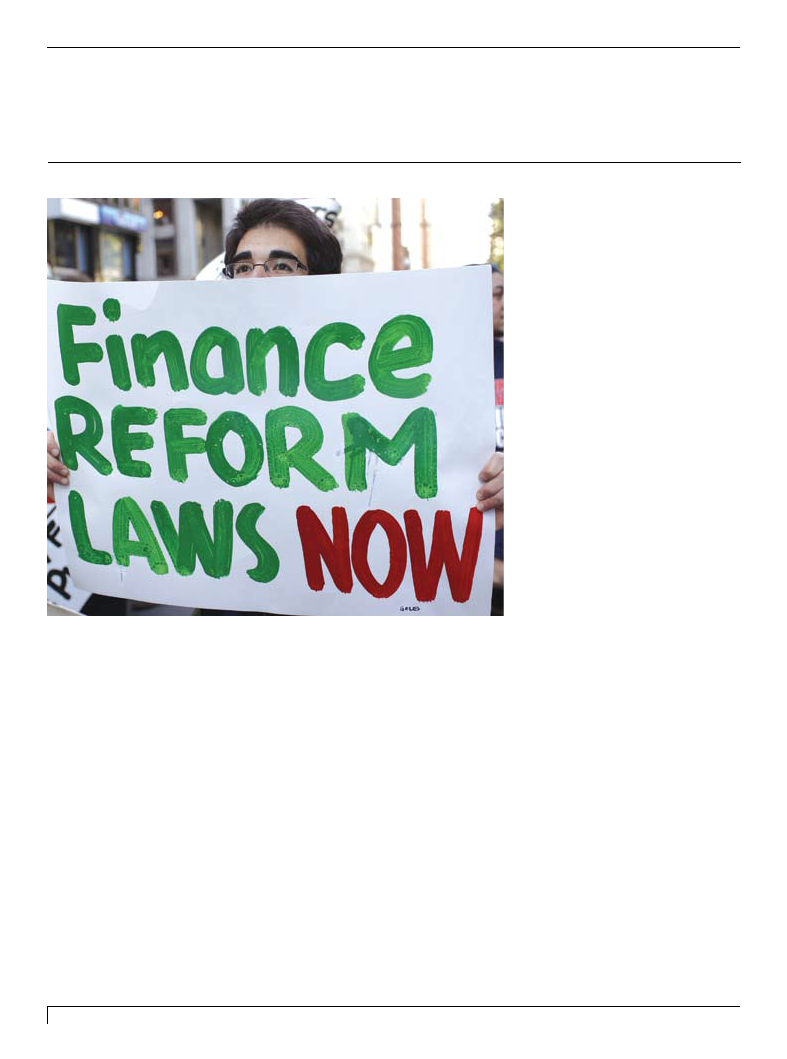Skatteudvalget 2010-11 (1. samling)
SAU Alm.del Bilag 54
Offentligt
How to reform and be re-elected?Aart de Geus,Deputy Secretary-General, OECD*
succeed, regardless of whether times areeconomically good or bad, while dividedgovernments create openings that reformopponents can exploit.Also, we have found that the benefitsand the costs of reforms are rarely evenlydistributed, so structural reforms mustbe backed by measures to compensatethose who lose from the reform or tophase in the reform so as to avoid hittingindividuals and households with sudden,negative shocks. That is why pensionreforms, for example, must typically bephased in over relatively long periods. Butwe also know that such measures mustbe temporary and targeted to compensatereal, and not merely perceived, losses.It took many countries decades toadjust the early retirement schemesthat were introduced in the early 1980sas compensation for job losses. Often,though, it may be possible to devise suchmeasures in a way that goes with the grainof the reform rather than cutting against it.Compromise need not undermine policycoherence, as the governments of Franceand Mexico discovered when adoptingpension reforms in 2003 and 2007,respectively.
� MikeSegar/Reuters
“To reform and to perform” is the goalof many a serious politician. It is not aneasy task.Noble people with fine ideas frequentlyfind their proposals scrutinised, distorted,and must put their own careers andpersonalities in the firing line. Electoratescan be hard to please. During times ofcrisis, the public clamours for change, butmay balk noisily at the solutions. Backlash,distrust, even protests follow, as we are nowwitnessing in many crisis-weary countries.As John Kenneth Galbraith once wrote,contradicting Bismarck, in a letter to JohnF Kennedy, “politics is not the art of thepossible. It consists of choosing between thedisastrous and the unpalatable.”If this is so, how can reforms be madeto work?
There has been much interesting workdevoted to the critical factors behind thesuccess and failure of reforms, but muchof it has been highly theoretical and thusof limited use to policymakers. Can we domore, without dwelling on a juicy collectionof anecdotes, and actually improve thereform process? Yes, we can, we should,and, in fact, we often do.Consider the vast half-century of experiencein reform efforts in OECD countries. Wehave studied 20 selected reform casesin the product markets, labour marketsand pensions. Our 2009 report,ThePolitical Economy of Reform,identifiessome interesting common denominatorsbehind initiatives that worked. It showsthat political consistency is more importantthan the economic cycle, for instance.Coherent and cohesive governments
Sound public finances also help a lot.This might sound paradoxical–today,fiscal discipline is an important driver forreforms, and countries cannot afford towait for their finances to be back on trackbefore embarking on reforms. But asstructural reforms, like in transportationor taxes, may bring transition costs, somefiscal room for manoeuvring has to bemaintained. In short, consolidation notonly keeps interest costs down for thefuture, but gives governments the room tobe able to cope with short-term challengesof structural reform.Reform is about changing for the better,and good policy is about making reformhappen. This is precisely the title ofanother OECD report which will belaunched in Paris on 26 November 2010.This time we analyse OECD reforms in ten
30
REFORM
different areas, including product markets,tax, environment, health, education,public administration, fiscal consolidation,regulatory policy, labour markets andpensions.These OECD reform experiencesconsistently point to the importance ofstrong leadership. However, this shouldnot be understood as advocacy of atop-down approach or a preference forunilateral action from on high. Whileunilateral reforms are sometimes theonly way forward, demanding bothdetermination and political cunning,our experience shows that successfulleadership is about winning consent, notsecuring compliance.At every level, be it national, local or eveninternational, it usually pays to engageopponents of reforms rather than simplytrying to override their position. Largelyfor this reason, effective communicationis of the greatest importance: one cannotoverestimate the role of consistency inbuilding and delivering the right politicalmessages, and highlighting the evidencewhen presenting the case for reform anddescribing the desired outcomes.This is particularly important in educationand health reforms, where professionals–ifnot engaged–tend to be successful inblocking reforms. In most countries, theycommand greater public trust than anypolitical executive and, in any case, theirinput may well improve the quality of theoriginal reforms. Commissioning researchby authoritative, impartial institutions,such as the Productivity Commission inAustralia or the CPB Netherlands Bureaufor Economic Policy Analysis, can alsohelp to win support, though it can alsolead to counter reports and accusations ofbias. But none of this should matter: asour report shows, a general lesson is thatstructural reforms often require severalattempts before they get through. Indeed,most success stories are etched fromthe ruins of previous failure. As SamuelBeckett said, “try again, fail better”.
There are many reasons why the OECDis committed to helping its members andpartners achieve successful reform. Wewant to build better policies for betterlives and to make our economies stronger,cleaner and fairer. This means beingprepared to change how we do things.Meanwhile, there are other particularchallenges to confront–climate change,population ageing, increasing competition,
Reform is about changing for thebetter, and good policy is aboutmaking reform happenpressures from globalisation, emergingimbalances in trade, finance and geopoliticalpower, and endemic poverty, to name but afew. Addressing these pressures demandsstructural reforms. Such challengesunderline the urgency of achieving the rightpolicy mix and of people (and countries)acting in concert, and without delay.Understandably, given the current financial,economic and social crisis, governmentswant to give priority to rescuing theirfinancial institutions and boosting theeconomy in the short term. But as we nowsee, there are no quick fixes. The recoveryis fragile, and we also see that climatechange, ageing and the other global issuesthat we faced before the crisis still hauntus. To quote the shortest novel ever written:“When he woke up, the dinosaur was stillthere” (Augusto Monterroso). We have nochoice, we have to face reality, and we haveto be quick. There is no time to lose on thelong and winding roads of reform–and wecould gain some time by making more of aneffort to learn from each other.So is there a recipe to reform and be re-elected? No, people tend to vote more onideas for the future than on results fromthe past. Alas, failures have more electoralimpact than successes. Even good andwell-managed reforms might not yield thedesired result in time for election day–as theHartz labour market reforms in Germanyshowed so clearly.
Still, here are a few tips. First, governmentsand political parties should design reformsin the pre-campaign period, use clearcommunication to promote them and thenstart implementing them from day one ofsettling into office. The rest is down to skill,judgement, leadership and support, andusing best practices and insights of the kindthe OECD can provide. After all, if reformis indeed more of an art than a science,politicians should at least ensure they areworking from a well-prepared “palette”.NOTE: The OECD high-level conference, MakingReform Happen, will be held on Friday 26November 2010 at the OECD Conference Centre in Paris.Participants will discuss how they can apply the lessonslearned in Making Reform Happen to the global challengesfaced by OECD countries and emerging economiestoday. The conference is organised jointly with the KoreaDevelopment Institute, and will be one of the first high-profile events to mark the OECD 50thanniversary.For more information, see www.oecd.org/mrh*Mr de Geus was Dutch minister for social affairs andemployment from 2002 to 2007.ReferencesOECD (2010),Making Reform Happen: Lessons fromOECD Countries,forthcoming, ISBN: 978-92-64-08628-9
Out soon!ISBN 978-92-64- 086289Order the book atwww.oecd.org/bookshop
OECD Observer
No 281 October 201031


